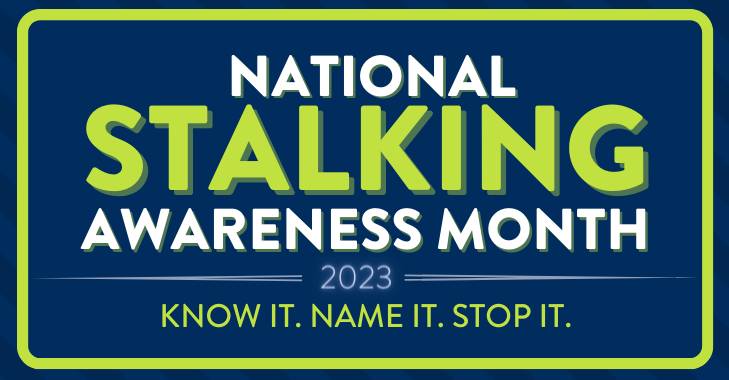Blog
Permanent link for Stalking Stigma on January 18, 2024
Although it might not be the label we use, many of us hear about, or even experience stalking. January is recognized nationally as Stalking Awareness Month. 18 to 24 year olds experience the highest occurrences of stalking, which can include many college students. We often oversimplify stalking behaviors as, “They’re bothering me” or “This person is being a little creepy”. By reducing the severity of these actions, stalkers can go on to continue these behaviors and cause detrimental effects. This can create stigma around the topic of stalking as well as result in destruction of a victim’s life.
Stalking Tactics
Stalking tactics can be categorized as surveillance, life invasion, intimidation or interference. People may believe stalking behaviors that are categorized as surveillance, for example watching or gathering information, may not be ‘as dangerous’. One article summarizes that throughout our justice system, physical harm is taken more seriously than psychological harm. This causes stalking charges to become less frequent due to the stigma of it. Stalking is a severe crime that can completely alter a victim’s life psychologically or even physically. Stalking tactics that are categorized as interference include: Spreading rumors, impersonating the victim, publicly sharing personal information, damaging property or even physical attack.
Many people experiencing stalking may be hesitant to report the crime. On average, only 39% of victims report to the police. The most common reasons for not reporting included, “it was “not a police matter” (20%), “police couldn’t do anything” (17%), and fear of “reprisal from stalker” (16%)”. These statistics for lack of reporting can be alarming, as the victims can experience negative consequences from stalking behaviors. The impacts of stalking for the victim can range from financial/occupational loss, depression, insomnia, anxiety and/or social dysfunction.
What is Stalking Exactly?
The definition can vary from state to state, or even between universities, due to different jurisdictions. Title IX defines stalking as, “Engaging in a course of conduct directed at a specific person that would cause a reasonable person to (1) Fear for the person’s safety or the safety of others; or (2) Suffer substantial emotional distress”.
As stated earlier, there are also many different stalking tactics. So, let’s break it down a little bit more:
Types of Stalking Behavior: (SLII)
Surveillance
-Watching and gathering information
- This includes following, watching, monitoring online presence, seeking out personal information or using tracking software
Life Invasion
-Showing up in victim’s life without consent
- This includes repeatedly initiating unwanted contact, sending gifts, spreading rumors, invaded property, humiliation, showing up to places that you commonly go
Intimidation
-Intimidation with the prior experiences and context in mind
- This can include threats- personally or others victim cares about-, blackmail, engagement in symbolic violence, anything to alarm or intimidate
Interference
-Affecting a victim’s reputation, career or safety
- This can include damaging property (or stealing), causing a serious accident, disrupted professional or social life, holding against will, assaulted victim or others close to victim
How Can I Prevent This or Take Action Against It?
It can be hard to know who to trust, but ultimately, trust your gut! If something doesn’t feel right, you’re probably right. Avoid giving out personal information such as phone numbers or addresses if possible. If you feel safe to do so, practice setting some boundaries. Here are some examples:
- “I am not interested in having a relationship with you. Do not contact me ever again”
- “I do not want you to have contact with me in any way. If you continue to do so-or if you are on my property, or follow me-I will call the police”
If you feel unsafe or the behaviors continue, seek help! You can either reach out to GVPD ((616) 331-3255) or directly call 911 if you are in immediate danger. Or you can contact 616-331-9530 to speak to the Office of Civil Rights and Title IX or 616-331-2742 to speak to Victim Advocate Stalking is a serious issue that can result in many harmful outcomes for the victims. Being aware of how stalking occurs and how to seek help can be extremely valuable to keep yourself and others safe!
By: Claire, WIT Peer Educator
Categories:
General Wellness
Posted
by
Katie Jourdan
on
Permanent link for Stalking Stigma on January 18, 2024.

